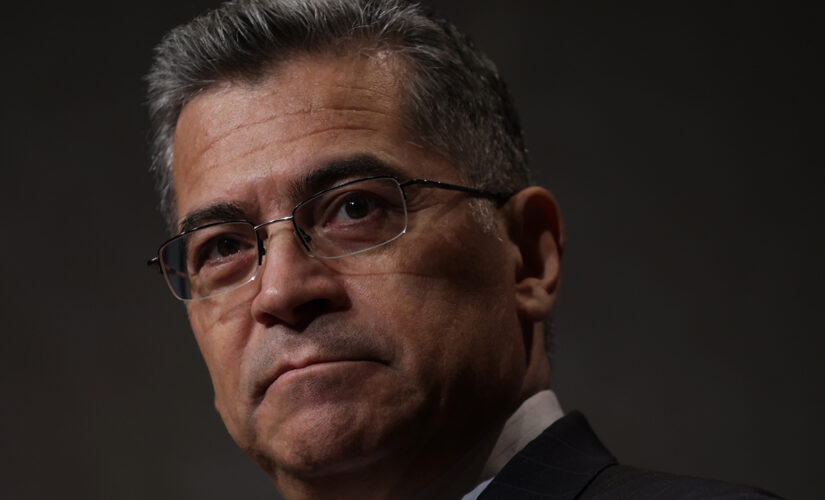NEWYou can now listen to Fox News articles!
The Biden administration unveiled an “action plan” to increase access to medication abortion pills for pregnant Americans on the fifth day since what Department of Health and Human Services (HHS) Secretary Xavier Becerra ripped as the “unconscionable” Supreme Court ruling overturning Roe v. Wade.
At a press conference Tuesday, Becerra detailed the five steps HHS will be taking to support President Biden’s promise Friday to ensure medication abortion is available “to the fullest extent possible” and that women can travel safely from states where abortion is banned to states where abortion is legal.
Becerra recalled how he was at a Planned Parenthood in St. Louis, Missouri, Friday morning when, through the Supreme Court’s decision overturning Roe v. Wade, “five Americans decided to use the vast power bestowed upon them by our democracy and our Constitution to unconscionably put at risk the life and health of millions of their fellow Americans.”
“They chose to unconscionably limit Americans’ established freedom and autonomy to control their own body – decisions usually made in consultation with their doctor, not a politician,” Becerra said, condemning the justices. “And they chose to unconscionably strip away the fundamental health care protections that every American of child-bearing age has known all their lives.”
“Friday’s Supreme Court decision was despicable, but it was also predictable,” he said. “HHS has been preparing for this for some time. That’s why, earlier this year, we launched our HHS Reproductive Access Task Force to plan for every action necessary to protect women’s access to reproductive health care.”
Secretary of Health and Human Services Xavier Becerra speaks during a news conference on June 28, 2022, in Washington.
(Alex Wong/Getty Images)
“There is no magic bullet,” he added. “But if there is something we can do, we will find it and we will do it at HHS. Indeed, that was the instruction I received from the president of the United States.”
Becerra argued in favor of medication abortion, arguing that it has been approved by the FDA for years, is safe for patients, and is the “golden standard” for when pregnant women experience a miscarriage.
He said HHS will be working with the Justice Department and U.S. Attorney General Merrick Garland as they ensure states cannot ban medication abortion, “based on a disagreement with the FDA’s expert judgment about the drug’s safety and efficacy.”
South Dakota Gov. Kristi Noem, as well as other Republican governors in states with trigger laws that effectively banned all abortions except to save a mother’s life following the Supreme Court ruling, raised safety concerns to telemedicine abortions, as pills are often taken at home without medial supervision.
“This is a critical moment in history. How we respond will speak to how we view the rights, dignity and well-being of women everywhere,” Becerra said in prepared remarks. “This is a moment of crisis in health care. We will leave no stone unturned. All options are on the table. We will do everything within the legal limit of the law to reach patients and support providers.”
Secretary Becerra unveiled “an action plan at President Biden’s direction” in response to the Supreme Court’s Dobbs decision.
(Alex Wong/Getty Images)
WHITMER SLAMS TRUMP FOR EXTREMISM AFTER QUESTION ADDRESSING THREATS FROM ‘PRO-ABORTION RIGHTS GROUP’
“I know we are all tired and our hearts are broken by this loss of rights and dignity. But now is the time for us to continue on for the many people across the country who live in banned abortion states, who lack voices that represent them,” Becerra added. “I stand with you and I have your back.”
After witnessing what he described as an “unshakeable sense of sadness” at the St. Louis clinic Friday as its director began turning away patients when the state’s abortion ban went into effect, Becerra said he traveled across the state line to Fairview Heights, Illinois, where abortion was still legal.
“I know we are all tired and our hearts are broken by this loss of rights and dignity,” Secretary Xavier Becerra said of Roe being overturned.
(Amanda Andrade-Rhoades/Bloomberg via Getty Images)
“It was shocking that, in the United States of America, a short drive can make such a dire and draconian difference in health care outcomes,” he said. “I saw restrictions that leave women and families on unequal footing and widen maternal health disparities. The impact was visible and real.”
In outlining HHS’ first step to increase access to medication abortion, the health secretary noted that federal law requires programs to provide medication abortion in limited circumstances, including life of the mother, rape or incest. Becerra argued that “now more than ever it is imperative that all federally-supported programs and services are complying and providing this under the law.”
The second step involves Becerra directing the Office for Civil Rights within HHS to ensure patient privacy and nondiscrimination for patients seeking reproductive health care, as well as for providers.
Third, Becerra said he directed his department to examine its authority under the Emergency Medical Treatment Act (EMTALA) to ensure that clinical judgment of doctors and hospitals is supported in treating pregnant patients, “including those experiencing pregnancy loss or complications, and reaffirming that abortion care can be appropriate to stabilize patients.”
CLICK HERE TO GET THE FOX NEWS APP
The secretary’s fourth step involved the department ensuring all providers, from doctors to pharmacists and clinics, have appropriate training on how to refer patients for abortions.
Lastly, Becerra directed the Centers for Medicare and Medicaid Services (CMS) to protect family planning, including emergency contraceptives and long-acting reversible contraceptives, such as IUDs.
“Health care is a matter to be decided by patients and their providers, not politicians,” he said. “As part of these efforts, we will make clear that family planning providers are able to participate in the Medicaid program. These clinics provide safe care and have a vast expertise in providing reproductive health care.”




